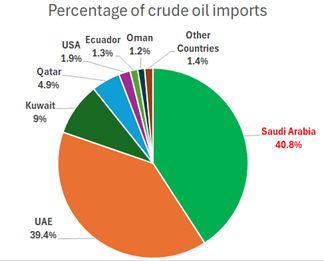
- ARAB NEWS
- 15 Jun 2025

Saudi Arabia and Japan have enjoyed a robust and evolving relationship since the formal establishment of diplomatic relations in 1955. This relationship is rooted in strong economic ties, with Japan becoming one of the largest importers of Saudi oil while providing high-level technology expertise in return. This oil-for-technology exchange has been mutually beneficial, allowing Saudi Arabia to fuel its economy while Japan secures a stable energy supply to support its industrial base.
Over the decades, the relationship between the two countries has expanded significantly beyond economic transactions. In the 1970s, Saudi Arabia began importing Japanese automobiles and electronics, establishing Japan as a key trade partner. This period also saw the commencement of various technical and developmental assistance programs by Japan, aimed at aiding Saudi Arabia’s infrastructure and industrial projects.
The relationship took on new dimensions with the introduction of Saudi Arabia’s Vision 2030 initiative, a strategic plan aimed at diversifying the Saudi economy away from oil dependence. Japan has been a significant partner in this effort, collaborating on projects in sectors such as renewable energy, infrastructure development and technology transfer. Japanese companies are heavily involved in major projects such as the development of smart cities and the modernization of the Kingdom’s industrial capabilities.
Cultural and educational exchanges have also played a vital role in strengthening bilateral ties. The Saudi-Japanese partnership includes scholarships for Saudi students to study in Japan, fostering a greater understanding and appreciation of Japanese culture within Saudi Arabia. Additionally, various cultural festivals and events held in both countries have showcased their rich heritages, thus further cementing people-to-people connections.
Japan’s energy relationship with Saudi Arabia has been a cornerstone of bilateral ties for several decades, with a focus primarily on oil and gas
Noriko Suzuki
High-level diplomatic visits have been a hallmark of the Saudi-Japanese relationship. Visits by Japanese prime ministers and members of the imperial family to Saudi Arabia, as well as reciprocal visits by Saudi royals and officials to Japan, have underscored the commitment to deepening ties. These visits often result in agreements that pave the way for joint ventures and cooperative projects in multiple sectors.
Overall, the Saudi-Japanese relationship is a successful and multifaceted partnership that has evolved to meet the changing needs and strategic interests of both nations. As Saudi Arabia continues to pursue its Vision 2030 goals, Japan remains a crucial ally, providing expertise, technology and investment to help achieve these ambitious objectives.
Japan’s energy relationship with Saudi Arabia has been a cornerstone of bilateral ties for several decades, with a focus primarily on oil and gas. Japan has long been one of the largest importers of crude oil from Saudi Arabia. This reliance on Saudi oil dates back to the 1960s, when Japan started importing significant quantities to fuel its growing economy. Saudi Arabia, as one of the world’s largest oil producers and exporters, has been a reliable supplier. More than 90 percent of Japan’s oil imports come from Saudi Arabia and other Gulf countries.
The relationship between Japan and Saudi Arabia centered on energy goes beyond simple buyer-seller dynamics. It is a strategic partnership based on mutual interests and stability in the global energy market. Japan values the stability of its energy supply and Saudi Arabia’s consistent production has been crucial in this regard. While oil remains a vital component of Japan’s energy mix, the country has also been actively diversifying its energy sources. This includes investments in renewable energy, nuclear energy (prior to the Fukushima disaster) and efforts to improve energy efficiency. However, oil still plays a significant role in Japan’s energy security strategy.
Apart from oil, Japan has also shown interest in liquefied natural gas and gas-related projects with Saudi Arabia. LNG imports have become increasingly important for Japan’s energy portfolio and Saudi Arabia has explored opportunities to supply LNG to Japan through projects and long-term contracts. Historically, Japanese companies have invested in Saudi Arabia’s energy sector, particularly in areas such as refining, petrochemicals and infrastructure. These investments have not only strengthened economic ties but also facilitated technology transfers and knowledge sharing between the two nations.
Recent geopolitical developments in the Middle East, including tensions and conflicts, have occasionally affected energy markets and Japan’s energy security. As a result, both countries have engaged in strategic dialogues and initiatives to address potential disruptions to ensure stable energy supplies.
In 2022, Saudi Crown Prince Mohammed bin Salman announced a $38 billion investment strategy for the Kingdom’s Savvy Games Group, owned by the Public Investment Fund. In 2023, PIF became the largest outside shareholder of Nintendo with a stake of 8.6 percent, according to a filing last June. It has also reportedly bought stakes in “Call of Duty” developer Activision Blizzard, Electronic Arts and “Street Fighter” producer Capcom.
Saudi Arabia is further keen to organize an electronic sports World Cup, starting this year, as part of a push to become the “premier global hub” for the industry, including homegrown studios making games. The Kingdom is also planning a theme park based on the “Dragon Ball” manga franchise with at least 30 rides and a 70-meter model dragon. The plans are part of the Kingdom’s Vision 2030 program.
In summary, Japan’s interest in the new global system and the new leadership of Saudi Arabia revolves around economic stability, security, technological advancement and strategic partnerships. Its economic positioning and alliances will adapt by diversifying supply chains, forging strategic partnerships and actively participating in global trade agreements. The centers of economic power in tomorrow’s world will be diverse, reflecting global trade networks, technological hubs and strategic alliances.
Japan’s collaboration with Saudi Arabia and the broader Arab world aims to create mutually beneficial economic partnerships, foster regional stability and serve as a counterbalance to escalating international rivalries through peaceful economic engagement and cooperation.